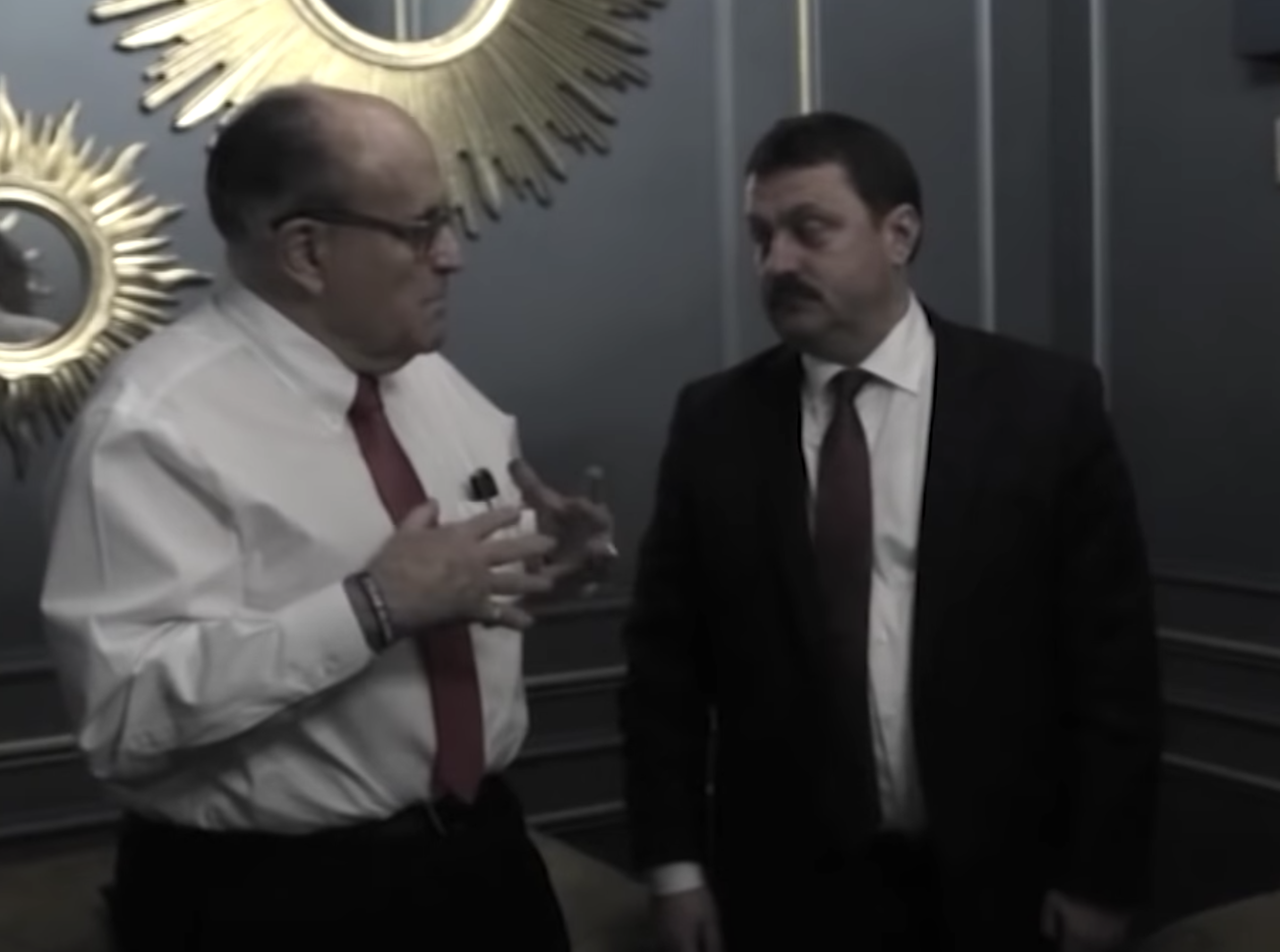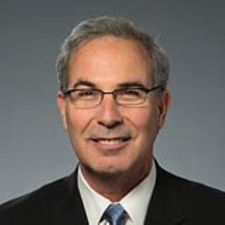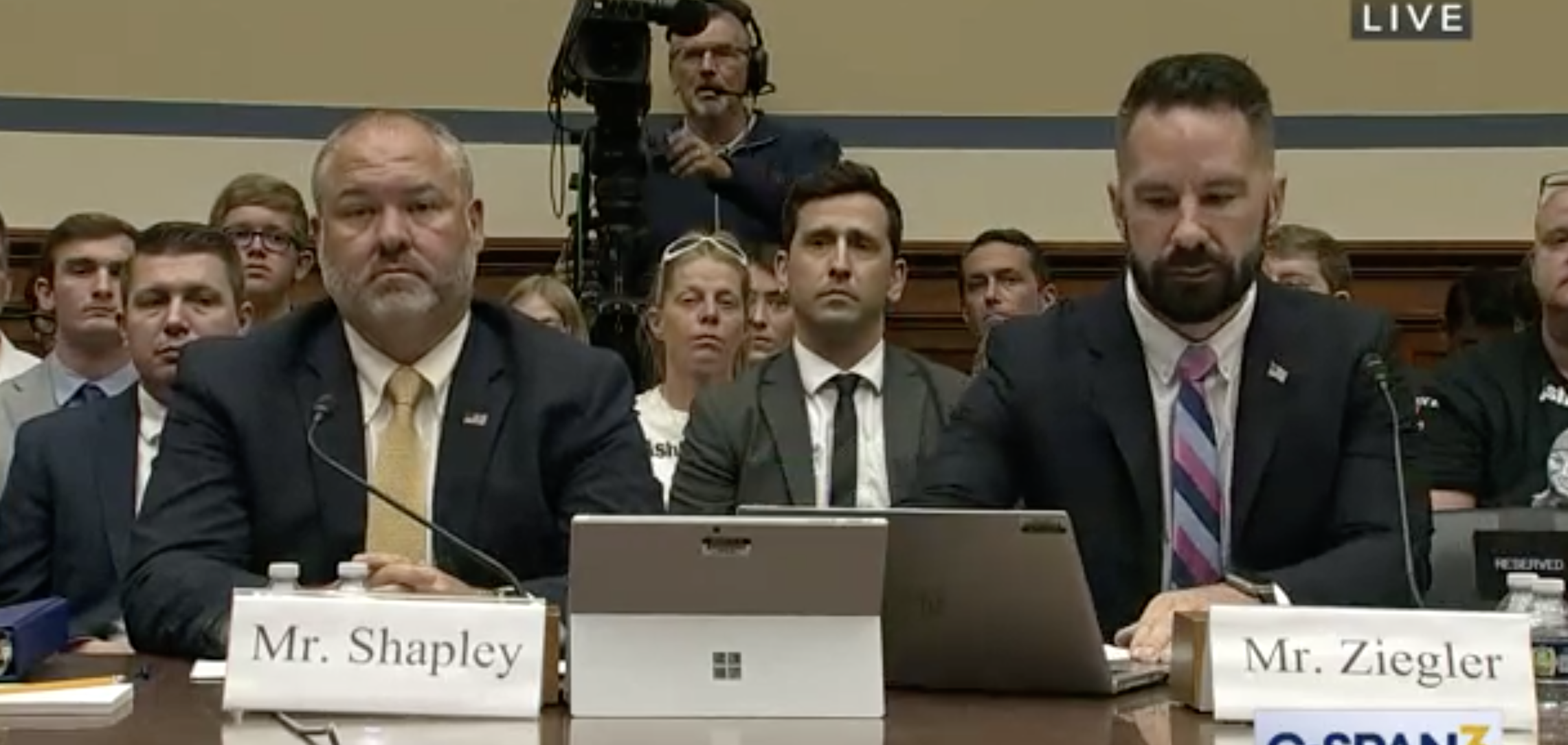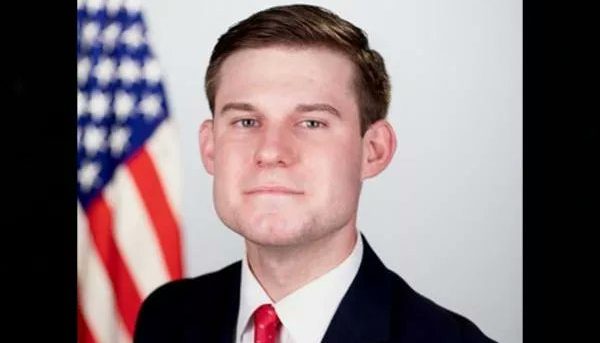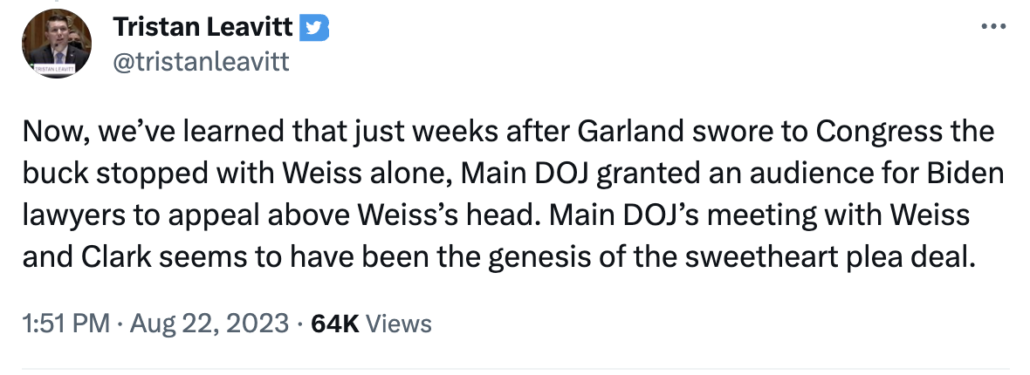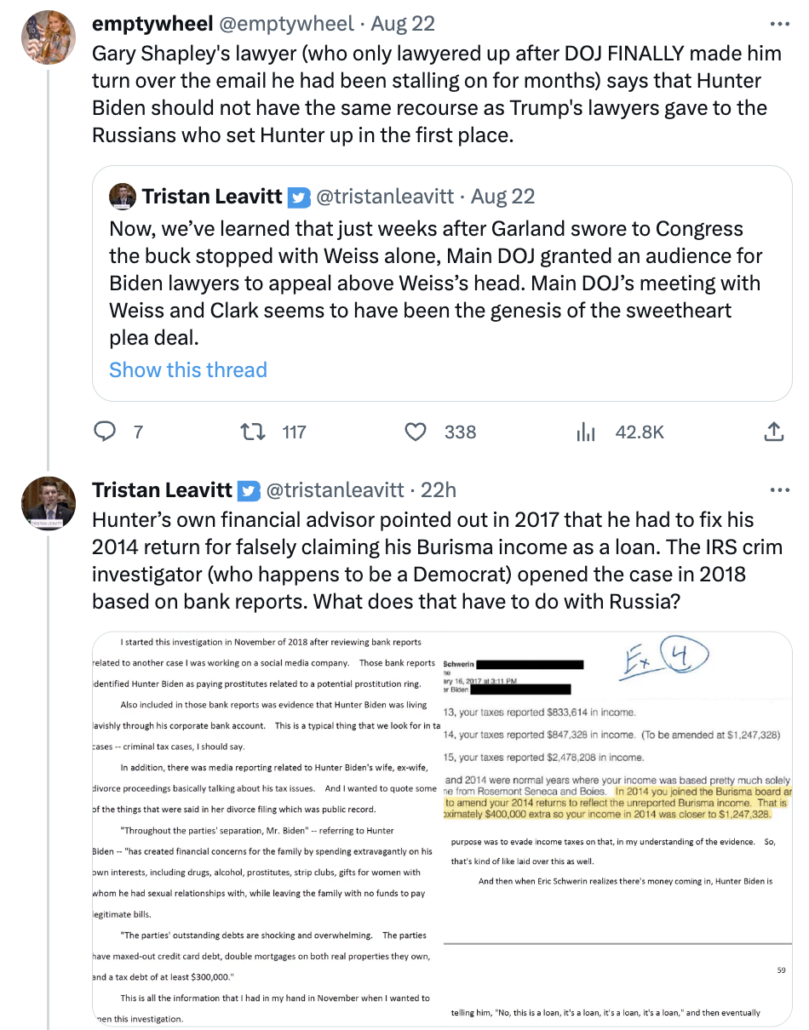Politico and NYT have stories — relying on what Politico describes as, “more than 300 pages of previously unreported emails and documents exchanged between Hunter Biden’s legal team and prosecutors,” — chronicling the legal negotiations leading up to the failed Hunter Biden plea deal.
Politico’s, written by Betsy Woodruff Swan, is good.
NYT’s is not, in part because it dedicates a long passage to repeating Gary Shapley’s claims without noting the many things in his own testimony that discredit those claims, even while relying on props from Shapley’s testimony that have since been challenged. Luke Broadwater knows where his beat gets sweetened, and it is in treating James Comer like a credible person, not in exhibiting the critical thinking of a journalist.
When first published, the NYT couldn’t even get the date of the failed plea hearing, July 26, correct.

But hey — at least that error is less catastrophic than the one in a WaPo story on the same topic the other day, in which three reporters (at least two of whom never bother to hide their right wing allegiances, particularly when it pertains to chasing Hunter Biden dick pics) claimed that Joe Biden was now a “former” President.
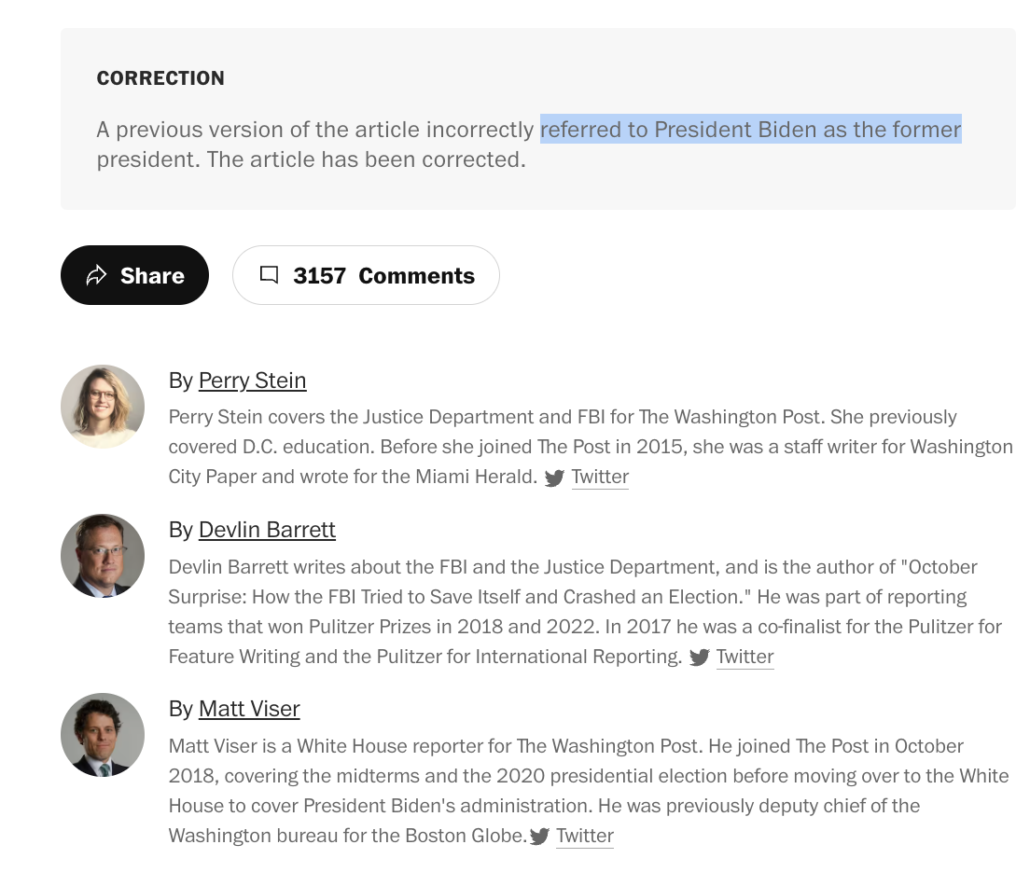
For its errors and other problems, however, the NYT story is useful for the way in which it puts David Weiss at risk for his own subpoena.
Hunter Biden lays the groundwork for holding the government to their signed agreements
To understand why, a review of the current state of the (known) legal case is in order.
On August 11, as Merrick Garland was announcing that he had given David Weiss Special Counsel status, Weiss’ prosecutors filed a motion to dismiss the charges against Hunter Biden. After describing that, “When the parties were proceeding to a negotiated resolution in this matter, a plea in this District was agreed upon,” the filing said that because Hunter did not plead guilty, it may have to file charges in the district where venue lies. At the same time, Weiss also moved to vacate the briefing schedule in the gun diversion.
Judge Maryellen Noreika gave Hunter a day to respond to the motion to vacate. That response, signed by Chris Clark but including Abbe Lowell on the signature line, explained that Hunter planned to fulfill the terms of the gun diversion agreement, which the government had stated was a contract between the two parties.
[T]he Defendant intends to abide by the terms of the Diversion Agreement that was executed at the July 26 hearing by the Defendant, his counsel, and the United States, and concurs with the statements the Government made during the July 26 hearing,1
The Government stated in open court that the Diversion Agreement was a “bilateral agreement between the parties” that “stand[s] alone” from the Plea Agreement, and that it was “in effect” and “binding.”
But, “in light of the United States’ decision on Friday to renege on the previously agreed-upon Plea Agreement, we agree that those issues are moot at this point.” Effectively, Hunter’s team was saying they considered the gun diversion as still valid, recognized everything else was moot, and described that it was moot because the government had reneged on the terms of the deal.
Then Abbe Lowell entered his appearance in the case. And Clark moved to withdraw from the case because — given that the plea and diversion would be contested — he might have to serve as a witness.
Mr. Clark’s withdrawal is necessitated by recent developments in the matter. Pursuant to Delaware Rule of Professional Conduct 3.7(a), “a lawyer shall not act as advocate at a trial in which the lawyer is likely to be a necessary witness unless… disqualification of the lawyer would work substantial hardship on the client.” Based on recent developments, it appears that the negotiation and drafting of the plea agreement and diversion agreement will be contested, and Mr. Clark is a percipient witness to those issues. Under the “witness-advocate” rule, it is inadvisable for Mr. Clark to continue as counsel in this case.
Noreika never actually approved Clark’s withdrawal, but the defense team filed notice that Hunter consented to the withdrawal while the docket remained active.
Meanwhile, Noreika ordered the government to reply to Hunter’s response on the briefing, and ordered Hunter to respond to the thing she failed to ask about in the first place, whether he objected to the dismissal of the charges.
Hunter’s team agreed that the charges must be dismissed, but reiterated that the court had no oversight over the diversion agreement (which had been Noreika’s complaint from the start).
Without adopting the Government’s reasoning, as venue for the existing information does not lie in this District, the information must be dismissed.
Further, the Defendant’s position is that the enforceability of the Diversion Agreement (D.I. 24-1 in No. 23-cr-00061-MN) has no bearing on the United States’ Motion to Dismiss for Lack of Venue (D.I. 31 in No. 23-mj-00274-MN), and any disputes regarding the effect of the Diversion Agreement are therefore not before the Court at this time.
The government, meanwhile, filed a seven page reply attempting to claim that the government did not renege on the plea that had been negotiated in advance of its filing in June, by describing how after Hunter refused to plead guilty because Leo Wise, an AUSA who had not been involved in the original deal, claimed its scope was far narrower than Hunter understood, the parties did not subsequently agree on one to replace the signed deal Hunter entered into.
First, the Government did not “renege” on the “previously agreed-upon Plea Agreement,” as the Defendant inaccurately asserts in the first substantive sentence of his response. ECF 33, Def. Resp. at 1. The Defendant chose to plead not guilty at the hearing on July 26, 2023, and U.S. Probation declined to approve the proposed diversion agreement at that hearing.
Then Noreika dismissed the charges.
David Weiss may have plenty of time to argue with Lowell, relying on Chris Clark’s testimony, that he should not be held to the terms of signed agreements he entered into in June.
But the two important takeaways from all this are, first, that Hunter Biden is stating that before the plea hearing, Weiss attempted to change the terms of the signed plea deal, and second, that Chris Clark is no longer bound by any terms of confidentiality that will allow him to prove that’s true.
A senior law enforcement official speaks, illegally
These twin stories are a warning shot to Weiss — before Hunter even gets more discovery on all the other problems with this investigation — what that is going to look like.
Which brings me to the things for which the NYT is really useful: giving David Weiss or someone in his immediate vicinity an opportunity to cause David Weiss more problems.
Three times in the story, NYT provides anonymity to a “senior law enforcement official” to push back on the representation of the deal, including as laid out by documentary evidence. In one such instance, NYT helpfully notes that if Weiss commented, he would be violating DOJ policies and possibly the law (though the leaks in this story don’t appear to violate grand jury secrecy).
A spokesman for Mr. Weiss had no comment. He is legally barred from discussing an open investigation, and a senior law enforcement official with knowledge of the situation pushed back on the idea that Mr. Weiss had been influenced by outside pressures, and ascribed any shifts to the typical ebb and flow of negotiations.
In a second instance, this anonymous “senior law enforcement official” denies something — that David Weiss told an associate that “the average American would not be prosecuted for similar offenses,” the kind of assertion that might provide basis for an exceedingly rare successful claim of selective prosecution — that only David Weiss would know.
Mr. Weiss told an associate that he preferred not to bring any charges, even misdemeanors, against Mr. Biden because the average American would not be prosecuted for similar offenses. (A senior law enforcement official forcefully denied the account.)
This chatty senior law enforcement official similarly denies something else that could bollox any further charges against Hunter Biden — that the only reason he “reneged” on the original terms of the plea deal are because IRS agents got journalists like the NYT’s to report claims of bias that their own testimony did not substantiate.
Now, the I.R.S. agents and their Republican allies say they believe the evidence they brought forward, at the precise time they did, played a role in influencing the outcome, a claim senior law enforcement officials dispute.
Now, normally, misconduct by a prosecutor like Weiss would be reviewed by the feckless Office of Professional Responsibility. But that’s less likely with a Special Counsel, because of the reporting structure for an SCO. And that’s particularly true here given the involvement of Associate Deputy Attorney General Bradley Weinsheimer in earlier discussions about the plea. Weinsheimer oversees OPR, and so any review by OPR presents a conflict. Indeed, Weiss may have asked to be made SCO precisely so he could escape the purview of OPR.
But to some degree that may not matter.
That’s because there are already parallel investigations — at TIGTA and at DOJ IG — into the leaking that occurred during this investigation. David Weiss was already going to be a witness in them, because Gary Shapley made claims about what Weiss said personally at a meeting on October 7, 2022, a meeting that was called first and foremost to discuss leaks.
So if Michael Horowitz wanted to subpoena Weiss to find out whether he was the senior law enforcement official denying things only he could deny, to find out whether days after being made a Special Counsel, Weiss decided to violate DOJ guidelines to which he still must adhere, the only way Weiss could dodge that subpoena might be to resign from both his US Attorney and his Special Counsel appointment.
And if Weiss and DOJ IG didn’t already have enough to talk about, there’s this passage from the NYT, with its truly epic use of the passive voice: “Mr. Weiss was quietly assigned,” by whom, NYT didn’t choose to explain.
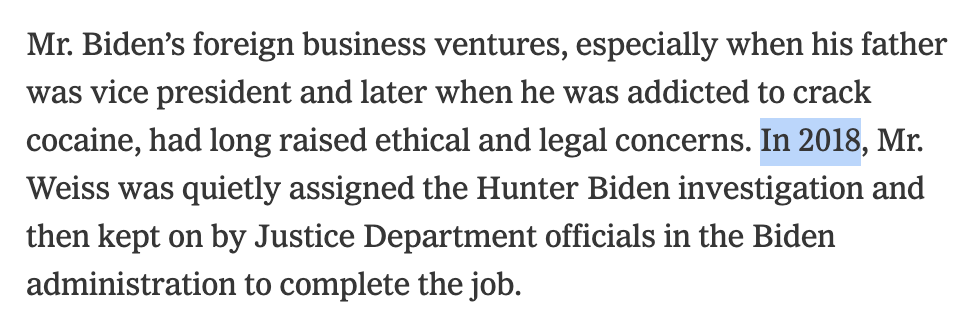
NYT corrected their earlier error on the date of the failed plea hearing, but the date here is probably another: Both IRS agents and the FBI agent have testified that this occurred in 2019, not 2018. Indeed, Joseph Ziegler testified, then thought the better of it, in a period when Bill Barr was making public comments about all this, that Barr himself was involved, which would date it to February 2019 or later, in a period when Barr was engaged in wholesale politiciziation of the department. Who assigned Weiss to investigate Joe Biden’s son as Trump demanded it would already be a question for any inquiry into improper influence, but it’s nice for NYT to make it more of one, in a story otherwise repeatedly sourced to “a senior law enforcement official” who might know.
I don’t know whether Hunter Biden’s lawyers deliberately intended to bait Weiss into responding in the NYT. But under DOJ guidelines, he is only permitted to respond to these claims in legal filings, after Abbe Lowell makes it an issue after Weiss files an indictment somewhere, thereby confirming precisely the concerns raised in these stories and creating another avenue of recourse to address these issues.
But whether that was the intention or not, that appears to be what happened.
And that’s on top of the things that Gary Shapley and Ziegler have made issues by blabbing to Congress: describing documentation in the case file of 6th Amendment problems and political influence, the documentation showing that no one had validated the laptop ten months after starting to use it in the investigation, Lowell’s claims that after the IRS got a warrant for an iCloud account that probably relied on the tainted laptop, they did shoddy summaries of WhatsApp texts obtained as a result and mislabeled the interlocutors, and Shapley’s own testimony showing that he was hiding something in his own emails.
That’s on top of anything that Denver Riggleman’s work with the “Hunter Biden” “laptop,” the one Weiss’ office never bothered to validate before using, has produced.
Don’t get me wrong: if and when Weiss decides to charge Hunter Biden with felonies — and I assume he will (indeed, given that the Bidens are all together in Tahoe this weekend, he may have already alerted Biden to that fact) — it’s going to be hell for everyone, for the entire country. But the IRS agents demanding this happen will have made things far harder for Weiss going forward with their disclosures of details of misconduct conducted under Weiss’ watch.
Hunter’s lawyers have already documented the political influence behind this case
Swan’s story, but not the Shapley-parroting NYT one likely based on the same documents, describes that Hunter’s lawyers repeatedly raised the improper political influence on this case, starting with an April 2022 Powerpoint presentation on why DOJ would be stupid to charge Hunter.
In light of Trump’s ceaseless demands for an investigation of the first son, charging the younger Biden with tax crimes would be “devastating to the reputation” of the Justice Department, his lawyers asserted. It would look like the department had acquiesced to Trump’s political pressure campaign.
They noted that Trump had laid into Biden in his speech to the rowdy crowd right before the Jan. 6, 2021, attack on the Capitol. “What happened to Hunter?” the president said. “Where’s Hunter? Where’s Hunter?”
Biden’s lawyers argued that the political pressure was itself a compelling reason not to bring any charges. A move seen as caving to the pressure, they contended, would discredit the department in the public eye, especially if the Justice Department was only going to charge him with paying his taxes late.
Clark wrote Weiss directly in October 2022, in the wake of the October 6 leak, noting that the only reason an unusual (and potentially unconstitutional) gun charge had been added in the interim was pressure from Republicans.
On Oct. 31, 2022, he wrote directly to David Weiss, the U.S. attorney for Delaware who was overseeing the probe. Weiss had been appointed by Trump and had been allowed to stay on during Joe Biden’s administration to continue the investigation — and Attorney General Merrick Garland had pledged to give Weiss full independence.
But Clark argued in his letter to Weiss that charging Hunter Biden with a gun crime would torpedo public trust in the Justice Department.
Biden, Clark continued, didn’t use the allegedly purchased gun to commit a crime, didn’t buy another one and didn’t have any prior criminal record. No drug user had ever been charged with a felony in Delaware for buying a gun under those same circumstances, he wrote. Prosecutors, he alleged, were weighing gun charges for one reason: “the relentless political pressure from the opponents of the current President of the United States.”
After all, Clark noted, federal law enforcement officials had known about Biden’s gun episode since 2018. Only politics explained why years later they were considering charges, he argued.
In January, Clark did another presentation — the first one threatening to put Joe Biden on the stand to talk about how this case was targeted at him, not Hunter.
He said Joe Biden would undoubtedly be a witness at trial because of leaks about the probe. He wrote that just a few weeks before sending his letter, there had been two back-to-back leaks related to Hunter Biden and the gun issue. First, someone told The Washington Post that investigators thought Biden deserved tax and gun charges. Then a few days later, The Daily Mail reported on a voicemail Joe Biden left for his son in the window of time when he allegedly owned the gun. Surely the back-to-back leaks were part of a coordinated campaign to push the Justice Department to charge his client with crimes. And, Clark said, the leaks prompted the president to address his son’s legal woes the next day on CNN.
“There can be no doubt that these leaks have inserted President Biden into this case,” he said.
On April 26, Associate Deputy Attorney General Bradley Weinsheimer met with Hunter’s lawyers, which immediately preceded the efforts to reach a plea deal.
On May 11, Weinsheimer thanked Clark for the meeting and told him Weiss would handle the next steps. The prosecutors appeared to be nearing the end of their investigation, and they were ready to make a deal. This type of process is not unusual in high-profile white collar investigations where the targets of the probes have engaged with the government and signaled openness to pretrial resolution.
On May 18, another lawyer for Biden sent two Delaware prosecutors — including Lesley Wolf, a senior prosecutor in the Delaware U.S. Attorney’s Office — the first draft of a proposed deal, structured so it wouldn’t need a judge’s sign-off and wouldn’t require a guilty plea from Biden.
As noted, Weiss may have used Weinsheimer’s intervention to justify his request to be appointed Special Counsel, but if he did it may backfire.
At each stage, after another wave of pressure from Republicans, the ask from prosecutors got bigger and bigger, first to include the gun, then to include a guilty plea with diversion.
That’s what the anonymous senior law enforcement official claims was just “ebb and flow.”
On June 7, the immunity agreement was written as follows.
The United States agrees not to criminally prosecute Biden, outside of the terms of this Agreement, for any federal crimes encompassed by the attached Statement of Facts (Attachment A) and the Statement of Facts attached as Exhibit 1 to the Memorandum of Plea Agreement filed this same day. This Agreement does not provide any protection against prosecution for any future conduct by Biden or by any of his affiliated businesses.
In the wake of the failed plea, prosecutors demanded that all immunity language be stripped, a truly insane ask.
No wonder Hunter’s lawyers are furious.
No wonder Clark dropped off the case, to be replaced by a far more confrontational Abbe Lowell, so he could lay all this out.
NYT describes that David Weiss thought that being provided Special Counsel status, “could provide him with added leverage in a revamped deal with Mr. Biden,” which is not something included in the Special Counsel regulations. Those regulations especially don’t envision getting that status for the purpose of reneging on already signed deals.
Abbe Lowell (who is not named in either of these stories) has something else entirely in mind.
Gary Shapley used notes that utterly contradict his public claims to dupe credulous reporters like Broadwater to build pressure on Weiss. Hunter’s team laid out that long before that, they had made the case that this prosecution was designed to target Joe Biden. Since then, they’ve identified at least one witness who could testify that Weiss is pursuing charges he knows other Americans wouldn’t face and learned of another — Ziegler’s first supervisor — who documented improper political influence from the start.
That’s before getting discovery that may show how Ziegler sat and watched as Hunter Biden’s digital identity got stolen and rather than doing anything to halt that attack in process, instead responded by deciding to charge Biden, not those tampering with his identity.
Sure. Weiss can charge the President’s son now — and he may well have already refiled tax charges in California.
But like his bid to renege on the original terms of the plea deal, that may not work out the way he thinks.

